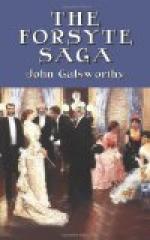Her lips pressed the middle of his cheek.
“Daddy!” she said, and was past and gone! Daddy! She hadn’t called him that for years. He drew a long breath and followed slowly down. There was all the folly with that confetti stuff and the rest of it to go through with yet. But he would like just to catch her smile, if she leaned out, though they would hit her in the eye with the shoe, if they didn’t take care. Young Mont’s voice said fervently in his ear:
“Good-bye, sir; and thank you! I’m so fearfully bucked.”
“Good-bye,” he said; “don’t miss your train.”
He stood on the bottom step but three, whence he could see above the heads—the silly hats and heads. They were in the car now; and there was that stuff, showering, and there went the shoe. A flood of something welled up in Soames, and—he didn’t know—he couldn’t see!
XI
THE LAST OF THE OLD FORSYTES
When they came to prepare that terrific symbol Timothy Forsyte—the one pure individualist left, the only man who hadn’t heard of the Great War—they found him wonderful—not even death had undermined his soundness.
To Smither and Cook that preparation came like final evidence of what they had never believed possible—the end of the old Forsyte family on earth. Poor Mr. Timothy must now take a harp and sing in the company of Miss Forsyte, Mrs. Julia, Miss Hester; with Mr. Jolyon, Mr. Swithin, Mr. James, Mr. Roger, and Mr. Nicholas of the party. Whether Mrs. Hayman would be there was more doubtful, seeing that she had been cremated. Secretly Cook thought that Mr. Timothy would be upset—he had always been so set against barrel organs. How many times had she not said: “Drat the thing! There it is again! Smither, you’d better run up and see what you can do.” And in her heart she would so have enjoyed the tunes, if she hadn’t known that Mr. Timothy would ring the bell in a minute and say: “Here, take him a halfpenny and tell him to move on.” Often they had been obliged to add threepence of their own before the man would go—Timothy had ever underrated the value of emotion. Luckily he had taken the organs for blue-bottles in his last years, which had been a comfort, and they had been able to enjoy the tunes. But a harp! Cook wondered. It was a change! And Mr. Timothy had never liked change. But she did not speak of this to Smither, who did so take a line of her own in regard to heaven that it quite put one about sometimes.
She cried while Timothy was being prepared, and they all had sherry afterward out of the yearly Christmas bottle, which would not be needed now. Ah! dear! She had been there five-and-forty years and Smither three-and-forty! And now they would be going to a tiny house in Tooting, to live on their savings and what Miss Hester had so kindly left them—for to take fresh service after the glorious past—No! But they would like just to see Mr. Soames again, and Mrs. Dartie, and Miss Francie, and Miss Euphemia. And even if they had to take their own cab, they felt they must go to the funeral. For six years Mr. Timothy had been their baby, getting younger and younger every day, till at last he had been too young to live.




